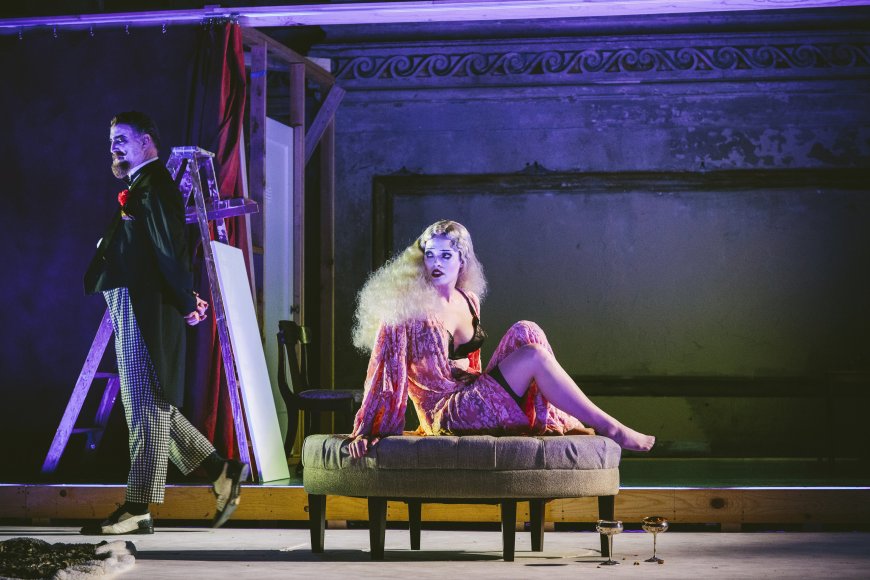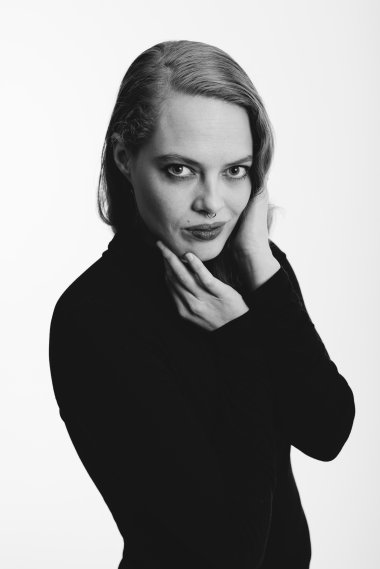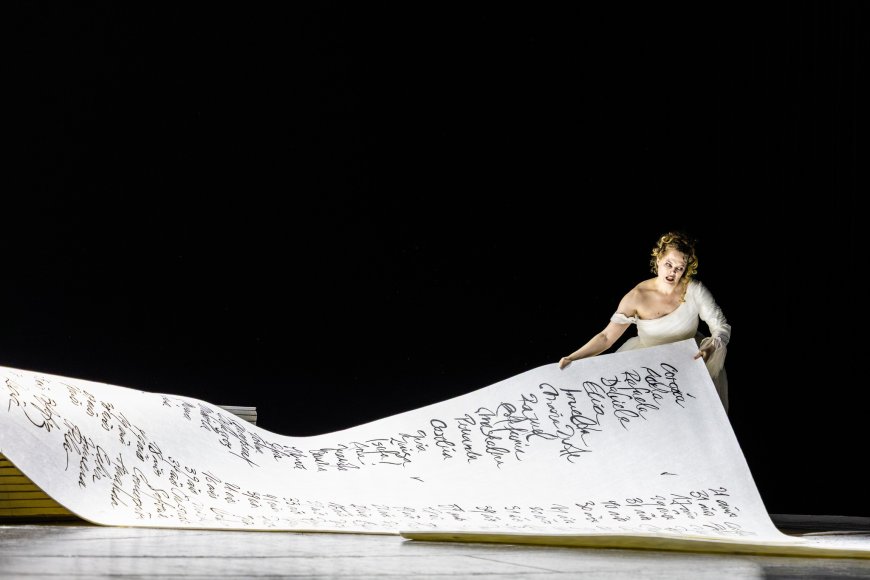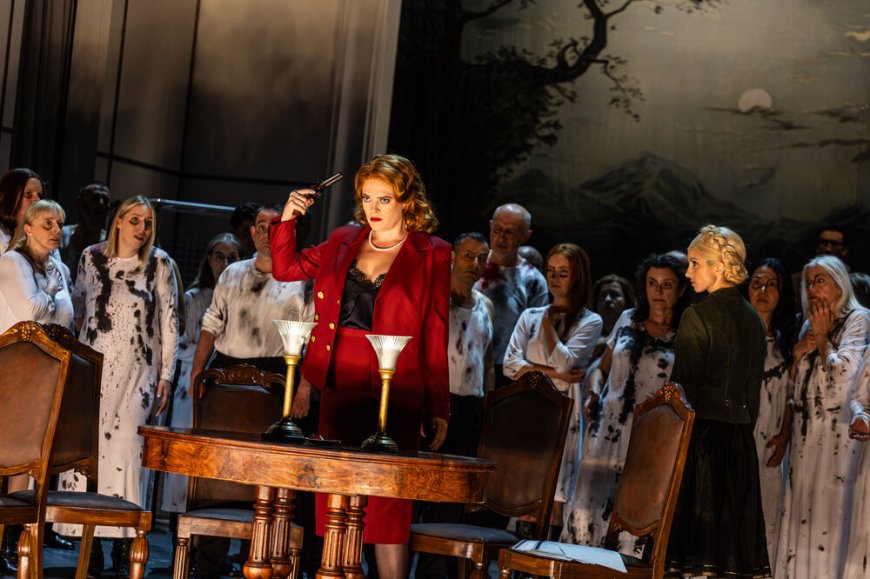
Emma McNairy is back in town.
The soprano was a regular at West Edge Opera from 2011 to 2017, appearing in performances of Richard Strauss's Ariadne auf Naxos, Ambroise Thomas’s Hamlet, Thomas Adès’s Powder Her Face, Claudio Monteverdi’s The Coronation of Poppea, and, most sensationally, her role debut as the title character in Alban Berg’s Lulu.
For the last eight years, McNairy, 37, has sung in Germany at three different Fest companies, where singers are contracted to sing specific roles in a particular season rather than freelancing across multiple companies. She started at the Theater Lübeck, moved to the Staatstheater Kassel for a season, and is now at the Staatstheater Meiningen.
McNairy is returning to West Edge Opera this August to play Marie in Berg’s first opera, Wozzeck. The production reunites McNairy with Elkhanah Pulitzer, who directed her in Lulu and Powder Her Face, and baritone Hadleigh Adams, one of her co-stars in Powder Her Face.
She’s been through a number of changes during her career in Germany. Her voice and repertoire have changed; she’s become fluent in German; and during a season at the Staatstheater Kassel, she met her now-wife, the Finnish bass-baritone Sam Taskinen, whom she married at San Francisco City Hall in 2023. The couple also had a ceremony in Finland, attended by both singers’ parents.

Tell us about your background.
I was born and grew up in Austin, Texas. I started singing in the Austin Children's Choir when I was eight because the music teacher at my elementary school was in the chorus of Austin Lyric Opera. She was in charge of recruiting kids from different choruses for children’s choruses in their operas. My first opera was La Bohème in 1997, then we did Tosca two years later, and Carmen two years after that.
When did you know that you wanted to be an opera singer?
During Carmen, I was 12, and old enough to start obsessing about opera. There was something about our Carmen, the Israeli mezzo[-soprano] Rinat Shaham; she was so engaging and enigmatic.
The production was like a West Edge production, [but] in a location where they used to do knife and gun shows.
I started voice lessons with Julian Reed, who was the chorus master. I wasn't a natural talent. Some people can just walk out and they're an opera singer. That was never me. I felt like I wanted [it] so badly that I was going to make it happen.
You graduated from the San Francisco Conservatory of Music. What brought you to the Bay Area?
I didn’t want to stay in Texas. I'm from Austin, and it's not so oppressive, but I knew I was queer very early on. I grew up with a very open-minded and liberal immediate family, but also a very conservative extended family.
I knew in high school that I wanted to go to conservatory. I applied to schools in Chicago, New York, and S.F. I got into Chicago and S.F., but I wanted to go to San Francisco. I'd never been before, but the first thing I did when I was 17 was to look online trying to find classical music resources. I found San Francisco Classical Voice, so I subscribed to their newsletter when I was 17. And I noticed that there seemed to be a lot of small [opera] companies.
Your roles in the coming year include Desdemona in Verdi’s Otello, Venus in Wagner’s Tannhäuser, and Agathe in Weber’s Der Freischütz. You’ve also recently sung Cio-Cio-San in Puccini’s Madama Butterfly. It’s very different repertoire from when you were younger, when you were singing light coloratura roles. Can you tell us about how your voice has changed over time?
I had a crisis in Kassel [in Germany]. I was the lead in Auber’s La muette de Portici, and I lost my voice. I couldn’t speak, and it took me eight weeks to get my voice back.
I had surgery three summers ago and my voice changed completely after it, for the better. I had edema and I was treated for it at the Berliner Centrum für Musikermedizin (Berlin Center for Musicians’ Medicine) at the Charité Medical Center. They’re the best in Germany. They told me singers come in almost every day with this injury. Nobody talks about it, but it’s very common and has to be surgically removed. I am talking about having surgery because of the huge taboo around it. I want to change this.
Two weeks after the surgery, I started vocalizing again. My wife, who’s an amazing singer with great ears, thought I might get my super high notes back after the surgery. And then, when I opened my mouth, my voice was four times bigger than before, because my vocal cords were closing correctly. I don’t know for how long I had been singing with the injury. It’s much easier now and I’m singing with my true voice, which isn’t a high coloratura.

What was it like singing the character Lulu?
For me and for many singers I know, singing is about finding out who we are as people and where we fit in the world, and how we're reflected in the things we’re singing. For me, Lulu did that. What an amazing role to take on and to make me look at my own life and myself and the strength she had.
She’s not an archetype. She’s so complicated. There are so many layers and she’s been through so much that I felt like I like to always bring my full self to a role and not just stay on these surface-level archetypal stereotypes.
And what’s it like singing Marie in comparison to Lulu?
Lulu is the title role, and Marie is not, so you can’t really compare them. [Conductor] Jonathan Khuner said that Marie has the more interesting journey, and I almost agree with him. Wozzeck’s headed downhill the whole time, but Marie makes choices that could go many different ways.
What is it like singing in Germany in Fest companies?
I learned truly how to sing when I moved to Germany. I was injured and I was singing the wrong repertory, but I still got a chance to sing every night. You don’t have a choice. You just go out and you do it regardless of how you're feeling. Young artists in America especially don’t often get that many chances to sing.
That's the beauty of the European [opera] house system: you get to just go out and try it. You might crash, but you might not. You learn something about how to sing.
I found Lübeck difficult, but I had just moved from San Francisco [and] my German was not fluent yet. The house gave me good opportunities. They cared about what I was singing. They asked me if I had opinions about what I could sing. I saw they were doing [Leonard] Bernstein’s A Quiet Place, which I love. I'd done the arias on my sophomore recital, and I asked the opera director if I could do the piece. They gave me two performances of it.
How much time did you spend learning Marie, your role in Wozzeck?
I got the score last September and started looking through it then. [Marie] isn’t [in] the whole opera and the opera’s only an hour and a half, so how hard could it be? But I was quite sick in the fall, and so I didn’t start really looking at it for real until the winter. I started working hard on it maybe three months ago.
When I learned Lulu, I was 26 and not getting hired a lot, so I took a year to learn it. I don’t have that privilege of time now.

What’s it like being back at West Edge with Hadleigh Adams and Elkhanah Pulitzer?
It’s the three of us and Jonathan, so we have our little team together again. Hadleigh, Elkhanah, and I worked so intensely in Powder Her Face on some intimate scenes, and we can put together some scenes very quickly [for Wozzeck] because we already did it nine years ago. You don’t really get to work like that anywhere else. I trust Elkhanah so much as a director.
Can you tell us about why your wife Sam, who is a transgender woman, isn’t coming here to see you in Wozzeck?
When we saw things about people’s passports needing to match their gender assigned at birth, we got worried. Sam would have probably been fine, but in that 1% chance that she wouldn’t be okay, we didn’t want her being detained in some sort of facility, especially in a male facility. This was back in April. We decided that because she is doing the semifinals of the Toivo Kuula Singing Competition in Finland in August and starts work at Finnish National Opera for Elektra, also in August, it would make more sense [for her] to just stay in Finland, prepare, not be jet-lagged, and also to not have to worry about possible transphobic border agents and laws in the U.S.
What are some of your known future roles and dream roles?
Give me any Verdi role and I’d be happy to sing it. Puccini’s Manon Lescaut. Elisabeth in Tannhäuser. Mimi, because it's the opera I fell in love with when I was eight. I might want to sing Salome someday; I love French repertory too.
What role for a different voice type would you sing if you could?
Amneris! You can’t beat the judgment scene.

